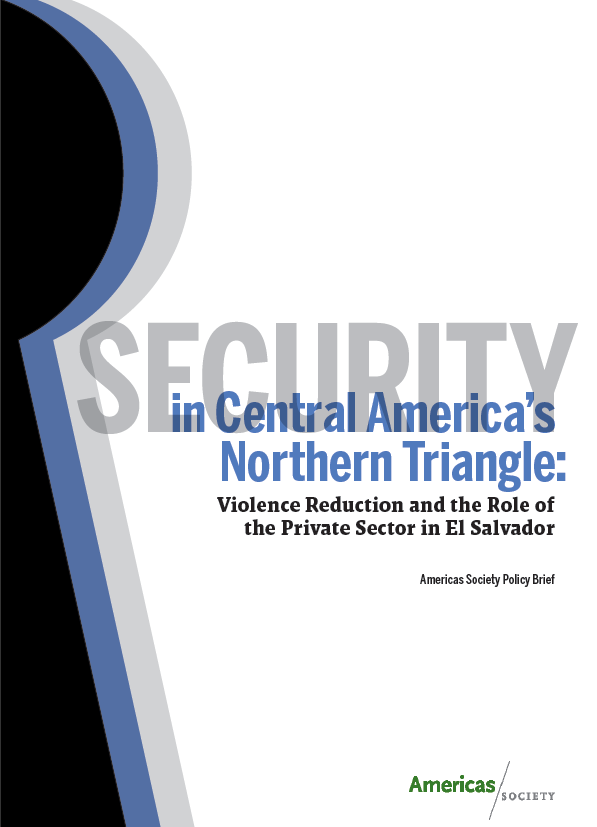Security in Central America's Northern Triangle: Violence Reduction and the Role of the Private Sector in El Salvador
Security in Central America's Northern Triangle: Violence Reduction and the Role of the Private Sector in El Salvador
This Americas Society policy brief highlights the role of the private sector in violence prevention to provide a more nuanced grasp of the space that can be filled by the business community.
 In the Northern Triangle countries of El Salvador, Guatemala, and Honduras, the increase in violence and organized crime highlights the need for new approaches to improve citizen security. In the case of El Salvador, a March 2012 gang truce has halved the daily homicide rate, opening an opportunity to build on existing efforts or to launch new approaches aimed at violence prevention.
In the Northern Triangle countries of El Salvador, Guatemala, and Honduras, the increase in violence and organized crime highlights the need for new approaches to improve citizen security. In the case of El Salvador, a March 2012 gang truce has halved the daily homicide rate, opening an opportunity to build on existing efforts or to launch new approaches aimed at violence prevention.
While public safety is the responsibility of the state, this Americas Society policy brief highlights the role of the private sector in violence prevention. It highlights innovative corporate efforts in violence prevention so that policymakers, businesses leaders, and others concerned about improvements in security can learn from these initiatives and obtain a more nuanced grasp of the possible space that can be filled by the private sector.
Security in Central America’s Northern Triangle: Violence Reduction and the Role of the Private Sector in El Salvador focuses on the role that multinational corporations can play in forging an integrated approach to crime reduction. This is a little known field in Central America. While the policy brief analyzes reinsertion efforts for former gang members and at-risk youth programs in the Salvadoran context, it also serves as a reference point for Honduras and Guatemala. Download the report here.
Drawing examples from a larger sample of violence prevention efforts, the Americas Society policy brief highlights five corporate efforts that are creating safer communities and contributing to business bottom line. The local focus and the direct or indirect cooperation with the public sector are critical to program success.
One of the companies, Grupo Calvo, employs 90 rehabilitated former gang members in its El Salvador plant—about 5 percent of its staff—and facilitates employment opportunities with suppliers for an additional 100 former gang members. These workers are some of the strongest and most productive employees at Grupo Calvo as well as at League Collegiate Wear, where 15 percent (40 employees) of its Salvadoran workforce joined the company through its reinsertion program. Additional companies featured in the policy brief include the AES Corporation, Microsoft Corporation, and Rio Grande Foods.
Five recommendations are issued:
- The private and public sectors each bring unique ideas, resources, and skills to violence prevention efforts and must find ways to coordinate these efforts, especially at the local level.
- Corporate practices to improve security must be continuously catalogued and updated with a central repository and coordinating institution.
- Private-sector violence prevention programs must be recognized both for their value in improving local communities as well the potential benefits they can bring to corporate bottom lines.
- Reinsertion efforts and at-risk youth programs analyzed in the Salvadoran context should serve as examples—both the lessons learned and the overall strategies—for other Northern Triangle countries.
- Regular dialogue between the public and private sectors is critical for identifying medium- to long-term violence prevention programs that will outlast the period in office of one particular official or political party.
Conclusions and recommendations draw from a series of Americas Society roundtable discussions with public and private sector stakeholders in El Salvador. This project was made possible with support from the Open Society Foundations.
- Download the report here.
- Read a Miami Herald op-ed by Jason Marczak about the private sector's role in reducing violence in Central America.
- Watch a video of Jason Marczak discussing the report on Voice of America.
- Read an interview with El Salvador’s Security Minister David Munguía Payés on the role of the private sector in furthering security.
- Read a World Politics Review article by Jason Marczak on regional security cooperation in Central America.
Policy brief authors:
- Jason Marczak, Director of Policy, Americas Society/Council of the Americas
- Alana Tummino, Manager of Policy, Americas Society/Council of the Americas
- Mari Hayman, Policy Associate, Americas Society/Council of the Americas
- Leani Garcia, Policy Intern, Americas Society/Council of the Americas
About the Security and Violence Prevention in Central America’s Northern Triangle Region project
This project is focused on advancing the security dialogue in the Northern Triangle region (El Salvador, Guatemala and Honduras) through consultations and roundtable meetings that bring together domestic and international business leaders, the public sector, local organizations, and highly regarded security experts and practitioners from across the Americas. Supported by Open Society Foundations, the goal is to begin to overcome some of the barriers for greater public-private collaboration in addressing crime and security challenges as well as preventing violence. Discussions are relevant to the experiences of El Salvador, Guatemala, and Honduras, but greater emphasis is on El Salvador since San Salvador was the site for the roundtable meetings.







